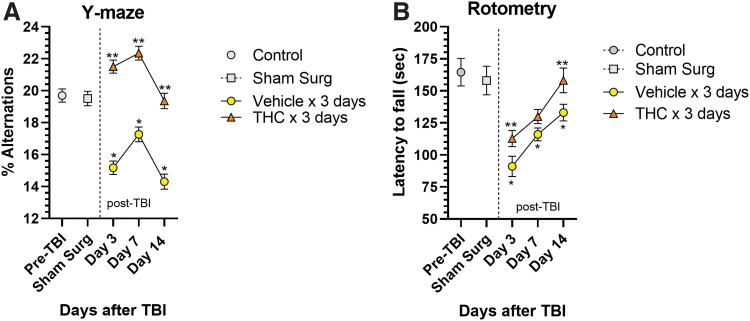FIG. 1.
Behavioral effects of CCI. (A) Y-maze was used to assess short-term hippocampal-dependent working memory. Following CCI, vehicle-treated mice (n=8) exhibited significant decreases in percent spontaneous alternations compared with pre-TBI and sham surgery controls at each time point (*p<0.05). Mice treated for 3 days with Δ9-THC exhibited significantly greater percent alternations than vehicle-treated mice (n=8) at all time points, indicating improvement in working memory (**p<0.05). Performance by the Δ9-THC group on days 3 and 7 was even better than in untreated controls and returned to pre-TBI level by day 14. Vehicle-treated mice performed worse than pre-TBI baseline at all 3 days. Two-way ANOVA showed treatment accounted for 37% of total variance (p<0.0001) and time accounted for 7% of total variance (p=0.07). Sidak's multiple comparisons test showed that the vehicle-treated mice performed significantly worse than pre-TBI performance at each time point (*p<0.05). The Δ9-THC treatment group performed significantly better than the vehicle treatment group at each time point (**p<0.05). (B) Rotometry: both the Δ9-THC-treated group (n=8 mice) and vehicle-treated group (n=8 mice) were trained to run on a rotometer before undergoing CCI. After CCI, treatment with Δ9-THC 3 mg/kg for 3 days resulted in a time-dependent recovery of motor function. Two-way ANOVA testing showed that both treatment (THC vs. vehicle) and time (days) after CCI contributed significantly to total variance (p<0.005). Sidak's correction for multiple comparisons revealed that THC significantly improved time on the rotometer compared with vehicle treatment on day 3 and 14 (**p<0.05). Vehicle-treated mice also gradually improved performance over time, but did not reach pre-TBI levels of performance. Sidak's correction for multiple comparisons showed performance in the vehicle-treated group remained significantly less compared with pre-TBI and sham surgery controls (*p<0.05). Δ9-THC, Δ9-tetrahydrocannabinol; ANOVA, analysis of variance; CCI, controlled cortical impact; TBI, traumatic brain injury.

